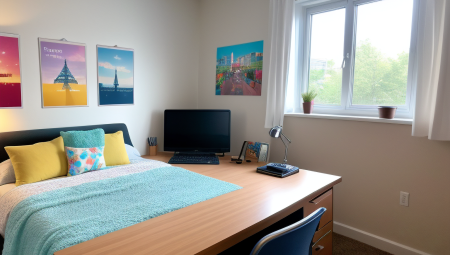Studying abroad is not just about hitting the books in a foreign land; it’s a life-altering journey that can completely reshape your view of the world. Imagine stepping into a vibrant new culture, where every street corner tells a story, and every meal is a new adventure. It’s like opening a book where each page reveals a different perspective, allowing you to understand and appreciate the diversity of human experience.
When you immerse yourself in a different culture, you gain valuable insights that textbooks simply can’t provide. You learn to navigate through unfamiliar environments, which fosters empathy and resilience. These experiences not only enhance your personal development but also equip you with a global mindset. Have you ever thought about how understanding different cultures could make you more adaptable in today’s interconnected world?
Moreover, studying abroad opens doors to unique academic opportunities that can enrich your educational journey. You might find yourself in classes that challenge your thinking in ways you never imagined, or engaging in projects that have a real-world impact. The connections you make during this time can lead to career-defining moments, shaping your future in ways you can’t yet foresee.
In essence, the experience of studying abroad is like planting a seed of curiosity that blossoms into a garden of knowledge, skills, and personal growth. So, are you ready to take the leap and discover how studying abroad could change your entire perspective?
Table of Contents
The Benefits of Cultural Immersion
When you step into a new culture, it’s like opening a door to a world you’ve never known. Cultural immersion is not just about visiting a place; it’s about diving headfirst into a different way of life. Imagine walking through bustling markets, tasting exotic foods, and engaging in local traditions. This experience can profoundly reshape your understanding of the world around you, fostering a sense of empathy and adaptability that’s hard to achieve in your comfort zone.
By living among locals, you gain insights that textbooks simply can’t provide. You learn to appreciate the nuances of different lifestyles, which can enhance your global awareness. For instance, interacting with diverse communities can challenge your preconceived notions and encourage you to think critically about your own culture. It’s like looking in a mirror that reflects not just your face but your values and beliefs.
Moreover, cultural immersion can lead to significant personal development. You might find yourself picking up new skills, whether it’s learning to cook a traditional dish or mastering a local dialect. These experiences not only enrich your life but also build lasting memories that will stay with you long after you return home. In essence, immersing yourself in a new culture is like planting seeds of growth that will bloom in unexpected ways throughout your life.
Academic Opportunities and Enhancements
Studying abroad is like opening a treasure chest of unique academic experiences that you simply can’t find at home. Imagine diving into courses that are tailored to the local culture and history, enriching your understanding in ways that textbooks alone can’t achieve. For instance, if you’re studying art history in Italy, you’ll have the chance to visit museums and galleries, experiencing masterpieces in their original context. This kind of immersive learning not only enhances your academic knowledge but also ignites a passion for your field that can be truly transformative.
Furthermore, many universities abroad offer specialised programmes that may not even be available in your home country. These can range from cutting-edge research opportunities to hands-on internships that provide invaluable experience. Take, for example, a student studying environmental science who has the chance to work on local conservation projects in Costa Rica. Such experiences can significantly shape your career trajectory.
Additionally, the diverse academic environments foster collaboration and innovation. You’ll be surrounded by peers from various backgrounds, each bringing their own perspectives and ideas. This not only enriches classroom discussions but also prepares you for an increasingly globalised job market. In essence, studying abroad is not just about earning credits; it’s about expanding your horizons and preparing for a future filled with possibilities.
Language Acquisition and Skills Development
Studying abroad is like jumping into a vibrant pool of languages, where every splash teaches you something new. Imagine waking up in a bustling city, surrounded by locals speaking a language you’re eager to master. This immersive experience not only enhances your language skills but also boosts your confidence and adaptability. When you’re forced to communicate in a foreign tongue, you learn to think on your feet—an invaluable skill in today’s fast-paced world.
Moreover, acquiring a new language goes beyond just vocabulary and grammar. It opens doors to understanding different cultures, traditions, and perspectives. You’ll find that language is the key to building relationships. Engaging in conversations with native speakers can lead to friendships that enrich your life and broaden your horizons.
Consider this: the ability to speak multiple languages significantly enhances your employability. In a globalised job market, employers often seek candidates who can communicate across cultures. According to recent studies, multilingual individuals have a competitive edge, often earning higher salaries compared to their monolingual counterparts. So, while you’re studying abroad, remember that every moment spent learning a language is an investment in your future.
Networking and Professional Growth
Studying abroad is not just about hitting the books; it’s a golden opportunity to build a global network that can significantly impact your career. Imagine being in a room filled with diverse minds from all over the world, each with unique perspectives and experiences. This rich tapestry of cultures enhances your learning and provides invaluable connections that can open doors to future job opportunities.
When you immerse yourself in a different educational system, you interact with professors and industry professionals who might not be accessible back home. These connections can lead to internships, job offers, or even collaborative projects that may shape your career trajectory. Furthermore, networking abroad often leads to friendships that transcend borders, creating a support system that can be beneficial long after your studies are complete.
To maximise your networking potential, consider the following strategies:
- Attend Local Events: Participate in workshops, seminars, and social gatherings to meet like-minded individuals.
- Join Student Organisations: Engage with clubs or societies that align with your interests or career goals.
- Utilise Social Media: Platforms like LinkedIn can help you connect with peers and professionals in your field.
In today’s job market, having a diverse network is more crucial than ever. It not only enhances your professional growth but also gives you a competitive edge, making you a more attractive candidate to employers. So, embrace every opportunity to connect while you’re abroad; you never know where these relationships might lead!
Enhanced Problem-Solving Abilities
Studying abroad is like stepping into a whole new world, and with that comes a myriad of challenges that can really test your mettle. Imagine trying to navigate a bustling foreign city, where every street sign is in a language you barely understand. This experience pushes you to think on your feet and develop . You learn to adapt quickly, whether it’s figuring out public transport or communicating with locals. Each obstacle you encounter is an opportunity to sharpen your skills.
Moreover, these challenges often require you to be resourceful. You might find yourself in situations where the usual solutions don’t apply. For instance, if your accommodation falls through, you’ll need to think creatively about where to stay. This kind of critical thinking not only boosts your confidence but also prepares you for real-world scenarios back home. In fact, many employers value this adaptability, knowing that you can tackle unexpected issues head-on.
To illustrate, consider the following examples of problems you might face and the skills you develop in response:
| Challenge | Skill Developed |
|---|---|
| Language Barrier | Improved Communication Skills |
| Finding Accommodation | Resourcefulness and Initiative |
| Adapting to Local Customs | Cultural Sensitivity |
In essence, the experience of studying abroad is not just about academics; it’s a crash course in life skills that can transform you into a more capable, confident individual. So, are you ready to embrace the challenges and emerge stronger?
Personal Growth and Self-Discovery
Studying abroad is like opening a door to a whole new universe of possibilities! Imagine stepping into a vibrant world where every street corner tells a story, and every encounter shapes your identity. This immersive experience pushes you beyond your comfort zone, allowing you to discover strengths and passions you never knew existed. It’s not just about academics; it’s about transforming your entire outlook on life.
When you live in a foreign country, you’re not just a visitor; you become part of a community that challenges your beliefs and expands your horizons. You learn to adapt, to communicate in new ways, and to appreciate diverse perspectives. This journey can lead to profound self-discovery, where you might find yourself questioning your values and aspirations. You’ll likely encounter moments of vulnerability, but these are the very experiences that foster resilience and confidence.
Consider the skills you acquire along the way:
- Adaptability: Learning to navigate daily life in a new culture.
- Independence: Managing your own affairs far from home.
- Empathy: Understanding and appreciating different viewpoints.
Ultimately, the journey of studying abroad is a catalyst for personal growth. By embracing the unknown, you not only enhance your academic knowledge but also embark on a path of self-exploration that can shape your future in unimaginable ways.
Overcoming Challenges While Abroad
Studying abroad is an exhilarating adventure, but it’s not all sunshine and rainbows. Many students encounter challenges that can feel overwhelming at times. One common hurdle is homesickness. It’s perfectly normal to miss the comforts of home, from familiar faces to favourite foods. To combat these feelings, try to stay connected with loved ones through video calls or social media. Don’t hesitate to share your experiences and feelings; you might find that others are feeling the same way!
Another significant challenge is cultural shock. When you immerse yourself in a new culture, everything from language to social norms can feel foreign. This can be disorienting, but it’s also a chance for growth. Embrace the differences! Engage with local customs and traditions, and don’t shy away from asking questions. Your curiosity will not only help you adapt but also enrich your experience.
Financial concerns can also loom large when studying abroad. Budgeting is essential to ensure you can enjoy your time without financial stress. Here are some tips to consider:
- Research and apply for scholarships or grants.
- Create a detailed budget before you leave, accounting for housing, food, and leisure activities.
- Look for part-time work opportunities if your visa allows it.
By acknowledging these challenges and actively seeking solutions, you can turn potential obstacles into stepping stones for a successful and enriching study abroad experience!
Managing Homesickness and Cultural Shock
Studying abroad is an exhilarating adventure, but it can also feel like a rollercoaster of emotions. Homesickness and cultural shock are common hurdles that many students face when they step into a new country. Imagine being in a vibrant, bustling city, yet feeling an overwhelming sense of loneliness as you long for the familiarity of home. This feeling is perfectly normal and can happen to anyone. The key is to acknowledge these emotions and find ways to manage them effectively.
One of the best ways to combat homesickness is to stay connected with loved ones back home. Regular video calls or messages can provide comfort and help you feel less isolated. Additionally, immersing yourself in the local culture can significantly ease cultural shock. Try to embrace the differences rather than resist them. Engage with local traditions, taste new foods, and make friends with locals. The more you immerse yourself, the more you’ll find a sense of belonging.
Here are a few tips to help you navigate these challenges:
- Establish a Routine: Creating a daily schedule can provide a sense of stability.
- Join Clubs or Groups: Engaging with fellow students can help build a support network.
- Seek Professional Help: If feelings of homesickness become overwhelming, consider talking to a counsellor.
Remember, every challenge is an opportunity for growth. By facing homesickness and cultural shock head-on, you’ll not only adapt to your new environment but also emerge stronger and more resilient.
Financial Considerations and Budgeting
Studying abroad can feel like a dream come true, but let’s face it—finances can quickly turn that dream into a nightmare if not managed properly. Before you pack your bags, it’s crucial to evaluate your financial situation and create a realistic budget. Start by considering tuition fees, accommodation, and daily living expenses. Did you know that the cost of living can vary significantly from one country to another? For instance, cities like London and New York can drain your wallet faster than you can say ‘study abroad’!
To help you navigate these financial waters, here are some tips:
- Research Scholarships: Many universities offer scholarships specifically for international students. Apply early!
- Consider Part-Time Work: Check local regulations regarding student work permits. A part-time job can ease financial stress.
- Open a Local Bank Account: This can save you on currency conversion fees and help you manage your budget more effectively.
Additionally, create a detailed budget plan. You might want to use a simple table like the one below to track your expected expenses:
| Expense Category | Estimated Cost (£) |
|---|---|
| Tuition Fees | £10,000 |
| Accommodation | £6,000 |
| Food | £2,500 |
| Transportation | £1,000 |
| Miscellaneous | £1,500 |
By keeping track of your expenses and planning ahead, you can focus more on your studies and less on your bank balance. Remember, with a little effort and foresight, you can turn your study abroad experience into a financially manageable adventure!
Frequently Asked Questions
- What are the main benefits of studying abroad?
Studying abroad opens up a world of opportunities! You get to immerse yourself in a new culture, enhance your academic experience, and develop vital skills like adaptability and problem-solving. It’s like hitting the refresh button on your life!
- How can I cope with homesickness while studying abroad?
Homesickness is totally normal. To tackle it, try staying connected with loved ones through video calls and social media. Also, make an effort to engage with locals and join student groups. It’s a bit like finding a new family away from home!
- What financial resources are available for studying abroad?
There are plenty of financial aids out there! Look into scholarships, grants, and student loans specifically for studying abroad. Budgeting wisely can also help—think of it as planning a road trip, but with a little more adventure!
- Will studying abroad improve my career prospects?
Absolutely! Employers love candidates with international experience. It shows you can adapt to new environments and think critically. Think of it as adding a shiny badge to your resume that says, “I’ve conquered the world!”





